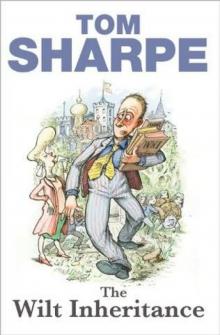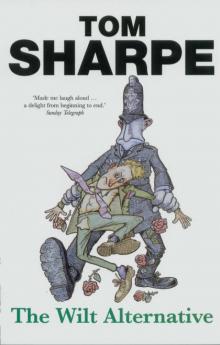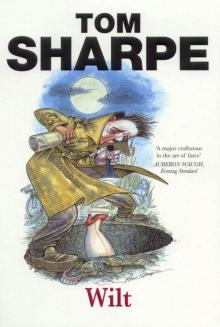- Home
- Tom Sharpe
The Throwback Page 2
The Throwback Read online
Page 2
*
At eighteen Jessica Sandicott was endowed with physical charms beyond her control and an innocence of mind that was both the fault and despair of her mother. To be more precise, her innocence resulted from the late Mr Sandicott’s will in which he had left all twelve houses in Sandicott Crescent ‘to my darling daughter, Jessica, on her reaching the age of maturity’. To his wife he bequeathed Sandicott & Partner, Chartered Accountants and Tax Consultants, of Wheedle Street in the City of London. But the late Mr Sandicott’s will had bequeathed more than these tangible assets. It had left Mrs Sandicott with a sense of grievance and the conviction that her husband’s premature death at the age of forty-five was proof positive that she had married no gentleman, the proof of his ungentlemanliness lying in his failure to depart this world at least ten years earlier when she was still at a reasonably remarriageable age, or, failing that, to have left her his entire fortune. From this misfortune Mrs Sandicott had formed two resolutions. The first was that her next husband would be a very rich man with a life expectancy of as few years as possible and preferably with a terminal illness; the second to see that Jessica reached the age of maturity as slowly as a religious education could delay. So far she had failed in her first objective and only partly succeeded in her second.
Jessica had been to several convents, and the plural was indicative of her mother’s partial failure. At the first she had developed a religious fervour of such pronounced proportions that she had decided to become a nun and subtract her own worldly possessions by adding them to those of the Order. Mrs Sandicott had removed her precipitately to a less persuasive convent and for a time things looked distinctly brighter. Unfortunately, so did several nuns. Jessica’s angelic face and innocence of soul had so combined that four nuns fell madly in love with her and the Mother Superior, to save their souls, had requested that Jessica’s disturbing influence be removed. Mrs Sandicott’s self-evident argument that she wasn’t to blame for her daughter’s attractions and that if anyone ought to be expelled it was the lesbian nuns cut no ice with the Mother Superior.
‘I do not blame the child. She was made to be loved,’ she said with suspicious emotion and in direct contradiction to Mrs Sandicott’s views on the subject. ‘She will make some good man a wonderful wife.’
‘Knowing men rather more intimately than I hope you do,’ riposted Mrs Sandicott, ‘she will marry the first scoundrel who asks her.’
It was a fatefully accurate prediction. To protect her daughter from temptation and to maintain her own financial income from the rents of the houses in Sandicott Crescent, Mrs Sandicott had confined Jessica to her home and a correspondence course in typing. By the time Jessica reached eighteen it was still impossible to say of her that she had reached the age of maturity. If anything she had regressed and while Mrs Sandicott supervised the running of Sandicott & Partner, the partner being a Mr Treyer, Jessica sank back into a literary slough of romantic novels populated entirely by splendid young men. In short she lived in a world of her imagination, the fecundity of which was proven one morning when she announced that she was in love with the milkman and intended to marry him. Mrs Sandicott studied the milkman next day and decided that the time had come for desperate measures. By no stretch of her own imagination could she visualize the milkman as an eligible young man. Her arguments to this effect, backed by the fact that the milkman was forty-nine, married and the father of six children, and hadn’t been consulted by his bride-to-be in any case, failed to influence Jessica.
‘I shall sacrifice myself to his happiness,’ she said. Mrs Sandicott determined otherwise and promptly booked two tickets on the Ludlow Castle in the conviction that whatever else the ship might have to offer in the way of possible husbands for her daughter, they couldn’t be less eligible than the milkman. Besides, she had herself to think of, and cruise liners were notoriously happy hunting-grounds for middle-aged widows with an eye to the main chance. That Mrs Sandicott’s own eye was fastened on an ancient and potentially terminal old man with money only made the prospect of the voyage the more desirable. And Lockhart’s appearance had heralded the mainest chance of all, an eligible and evidently half-witted young man for her idiot daughter and in his stateroom a gentleman of ninety with an enormous estate in Northumberland. That night Mrs Sandicott went to sleep a cheerful woman. In the bunk above Jessica sighed and murmured the magical words, ‘Lockhart Flawse of Flawse Hall on Flawse Fell close under Flawse Rigg.’ They formed a litany of Flawse to the religion of romance.
*
On the boat-deck Lockhart leant on the rail and stared out over the sea, his heart filled with feelings as turbulent as the white wake of the ship. He had met the most wonderful girl in the world and for the very first time he realized that women were not simply unprepossessing creatures who cooked meals, swept floors and, having made beds, made strange noises in them late at night. There was more to them than that but what that something more was Lockhart could only guess.
His knowledge of sex was limited to the discovery, made while gutting rabbits, that bucks had balls and does didn’t. There appeared to be some connection between these anatomical differences that accounted for ladies having babies and men not. On the one occasion he had attempted to explore the difference further by asking the tutor in Urdu how Mizriat begat Ludin in Genesis 10:13 he had received a clout across the ear that had temporarily deafened him and had given him the permanent impression that such questions were better left unasked. On the other hand he was aware that there was such a thing as marriage and that out of marriage came families. One of his distant Flawse cousins had married a farmer from Elsdon and had subsequently raised four children. The housekeeper had told him as much and no more, except that it had been a shotgun marriage which had merely deepened the mystery, shotguns in Lockhart’s experience being reserved for putting things to death rather than bringing them to life.
To make matters even more incomprehensible, the only occasions on which his grandfather had permitted him to visit his relatives had been to their burials. Mr Flawse enjoyed funerals immensely. They reinforced his belief that he was hardier than any other Flawse and that death was the only certainty. ‘In any uncertain world we can take consolation in the verity, the eternal verity, that death comes to us all in the end,’ he would tell a bereaved widow to terrible effect. And afterwards, in the jaunting-cart he used for such outings, he would expatiate glowingly to Lockhart on the merits of death as preserver of moral values. ‘Without it we would have nothing to stop us from behaving like cannibals. But put the fear of death up a man and it has a wondrously purgative effect.’
And so Lockhart had continued in ignorance of the facts of life while acquiring extensive knowledge of those of death. It was left to his bodily functions and his feelings to guide him in quite contrary directions in the matter of sex. Lacking a mother and loathing most of his grandfather’s housekeepers, his feelings for women were decidedly negative. On the more positive side he got a great deal of pleasure from nocturnal emissions. But their significance escaped him. He didn’t have wet dreams in the presence of women and he didn’t have women at all.
And so leaning on the guard rail staring down at the white foam in the moonlight Lockhart expressed his new feelings in images he knew best. He longed to spend the rest of his life shooting things and laying them at Jessica Sandicott’s feet. With this exalted notion of love Lockhart went down to the cabin where old Mr Flawse, clad in a red flannel nightgown, was snoring noisily, and climbed into bed.
*
If Mrs Sandicott’s expectations had been aroused by Lockhart’s appearance at dinner they were confirmed by old Mr Flawse at breakfast. Dressed in a suit that had been out of fashion as far back as 1925, he cut a swathe through subservient waiters with an arrogance far older than his suit and, taking his place with a ‘Good morning to you, ma’am,’ surveyed the menu with disgust.
‘I want porridge,’ he told the headwaiter who hovered nervously, ‘and none of your half-boiled mush. Oa
ts, man, oats.’
‘Yes, sir, and what to follow?’
‘A double ration of eggs and bacon. And find some kidneys,’ said Mr Flawse to the prognostic delight of Mrs Sandicott, who knew all there was to know about cholesterol. ‘And by double I mean double. Four eggs and a dozen rashers. Then toast and marmalade and two large pots of tea. And the same goes for the boy.’
The waiter hurried away with this lethal order and Mr Flawse looked over his glasses at Mrs Sandicott and Jessica.
‘Your daughter, ma’am?’ he enquired.
‘My only daughter,’ murmured Mrs Sandicott.
‘My compliments to you,’ said Mr Flawse without making it clear whether he was praising Mrs Sandicott for her daughter’s beauty or her singularity. Mrs Sandicott blushed her acknowledgement. Mr Flawse’s old-world manners were almost as enchanting to her as his age. For the rest of the meal there was silence broken only by the old man’s denunciation of the tea as weaker than well-water and his insistence on a proper pot of breakfast tea you could stand your spoon up in. But if Mr Flawse appeared to be concentrating on his bacon and eggs and tea that contained enough tannin to scour its way through a blocked sewer-pipe, his actual thoughts were elsewhere and moved along lines very similar to those of Mrs Sandicott though with a rather different emphasis. In the course of his long life he had learnt to smell a snob a mile off and Mrs Sandicott’s deference suited him well. She would, he considered, make an excellent housekeeper. Better still, there was her daughter. She was clearly a gormless girl, and just as clearly an ideal match for his gormless grandson. Mr Flawse observed Lockhart out of the corner of a watery eye and recognized the symptoms of love.
‘Sheep’s eyes,’ he muttered aloud to himself to the confusion of the hovering waiter, who apologized for their not being on the menu.
‘And who said they were?’ snapped Mr Flawse, and dismissed the man with a wave of a mottled hand.
Mrs Sandicott absorbed all these details of behaviour and calculated Mr Flawse to be exactly the man she had been waiting for, a nonagenarian with an enormous estate, and therefore an enormous bank account, and an appetite for just those items on the menu best suited to kill him off almost immediately. It was therefore with no affectation of gratitude that she accepted his offer of a stroll round the deck after breakfast. Mr Flawse dismissed Lockhart and Jessica to go and play deck quoits, and presently he and Mrs Sandicott were lapping the promenade deck at a pace that took her breath away. By the time they had covered the old man’s statutory two miles, Mrs Sandicott’s breath had been taken away for other reasons. Mr Flawse was not a man to mince his words.
‘Let me make myself plain,’ he said unnecessarily as they took their seats in deckchairs, ‘I am not overgiven to delaying my thoughts. You have a daughter of marriageable age and I have a grandson who ought to be married. Am I right?’
Mrs Sandicott adjusted the blanket round her knees and said with some show of delicacy that she supposed so.
‘I am so, ma’am,’ said Mr Flawse, ‘I know it and you know it. In truth we both know it. Now, I am an old man and at my age I cannot expect a sufficient future to see my grandson settled according to his station. In short, ma’am, as the great Milton expressed it, “in me there’s no delay”. You take my meaning?’
Mrs Sandicott took it and denied it simultaneously. ‘You’re quite remarkably fit for your time of life, Mr Flawse,’ she said encouragingly.
‘That’s as may be, but the Great Certainty looms,’ said Mr Flawse, ‘and ’tis equally certain that my grandson is a nincompoop who will in a short time, being my only heir, be a rich nincompoop.’
He allowed Mrs Sandicott to savour the prospect for a moment or two. ‘And being a nincompoop he needs a wife who has her head screwed on the right way.’
He paused again and it was on the tip of Mrs Sandicott’s tongue to remark that Jessica’s head, if screwed on at all, had been screwed on against the thread, but she restrained her words.
‘I suppose you could say that,’ she said.
‘I can and I do,’ continued Mr Flawse. ‘It has ever been a Flawse trait, ma’am, in choosing our womenfolk, to take cognizance of their mothers, and I have no hesitation in saying that you have a shrewd head for business, Mrs Sandicott, ma’am.’
‘It’s very kind of you to say so, Mr Flawse,’ Mrs Sandicott simpered, ‘and since my poor husband died I have had to be the breadwinner. Sandicott & Partner are chartered accountants and I have run the business.’
‘Exactly,’ said Mr Flawse. ‘I have a nose for these things and it would be a comfort to know that my grandson was in good hands.’ He stopped. Mrs Sandicott waited expectantly.
‘And what hands did you have in mind, Mr Flawse?’ she asked finally, but Mr Flawse had decided the time had come to feign sleep. With his nose above the blanket and his eyes closed he snored softly. He had baited the trap. There was no point in watching over it and presently Mrs Sandicott stole quietly away with mixed feelings. On the one hand she had not come on the cruise to find a husband for her daughter; she had come to avoid one. On the other, if Mr Flawse’s words meant anything he was looking for a wife for his grandson. For one wild moment Mrs Sandicott considered Lockhart for herself and instantly rejected him. It was Jessica or no one, and the loss of Jessica would mean the loss of the rent of the twelve houses in Sandicott Crescent. If only the old fool had proposed to her she would have seen things in a different light.
‘Two birds with one stone,’ she murmured to herself at the thought of a double killing. It was worth calculating about. And so, as the two young lovers gambolled on the sun-deck, Mrs Sandicott ensconced herself in a corner of the First Class Lounge and calculated. Through the window she could keep an eye on the blanketed figure of Mr Flawse recumbent in the deckchair. Every now and again his knees twitched. Mr Flawse had given way to those sexual excesses of the imagination which were the bane of his nonconformist conscience, and for the first time Mrs Sandicott figured in them largely.
3
Imagination played a large part in the love that blossomed between Lockhart and Jessica. Having plunged they sported like water babies in the swimming pool or frolicked at deck tennis and as each day passed, and the ship steamed slowly south into equatorial waters, their passion grew inarticulately. Not entirely inarticulately but when they spoke during the day their words were matter of fact. It was only at night, when the older generation danced the quickstep to the ship’s band and they were left alone to stare down at the white water swirling from the ship’s side and invest one another with those qualities their different upbringings had extolled, that they spoke their feelings. Even then it was by way of other people and other places that they told one another what they felt. Lockhart talked of Mr Dodd and how at night he and the gamekeeper would sit at the settle in the stone-flagged kitchen with the black iron range glowing between them while the wind howled in the chimney outside and Mr Dodd’s pipes wailed inside. And of how he and Mr Dodd would herd the sheep or stalk game in the wooded valley known as Slimeburn where Mr Dodd dug coal from a drift mine that had first been worked in 1805. Finally there were the fishing expeditions on the great reservoir fringed with pine that stood a mile from Flawse Hall. Jessica saw it all so clearly through a mist of Mazo de la Roche and Brontë and every romantic novel she had ever read. Lockhart was the young gallant come to sweep her off her feet and carry her from the boredom of her life in East Pursley and away from her mother’s cynicism to the ever-ever land of Flawse Hall on Flawse Fell close under Flawse Rigg where the wind blew fierce and the snow lay thick outside but all within was warm with old wood and dogs and the swirl of Mr Dodd’s Northumbrian pipes and old Mr Flawse sitting at the oval mahogany dining-table disputing by candlelight questions of great moment with his two friends, Dr Magrew and Mr Bullstrode. In the tapestry woven from Lockhart’s words she created a picture of a past which she dearly longed to make her future.
Lockhart’s mind worked more practically. To him Jessica was an angel
of radiant beauty for whom he would lay down, if not his own life, at least that of anything which moved within range of his most powerful rifle.
But while the young people were only implicitly in love, the old were more outspoken. Mr Flawse, having baited the trap for another housekeeper, waited for Mrs Sandicott’s response. It came later than he had expected. Mrs Sandicott was not a woman to be hustled and she had calculated with care. Of one thing she was certain. If Mr Flawse wanted Jessica for his daughter-in-law he must take her mother for his wife. She broached the subject with due care and by way of the mention of property.
‘If Jessica were to marry,’ she said one evening after dinner, ‘I would be without a home.’
Mr Flawse signalled his delight at the news by ordering another brandy. ‘How so, ma’am?’ he enquired.
‘Because my poor dear late husband left all twelve houses in Sandicott Crescent, including our own, to our daughter and I would never live with the young married couple.’
Mr Flawse sympathized. He had lived long enough with Lockhart to know the hazards of sharing a house with the brute. ‘There is always Flawse Hall, ma’am. You would be very welcome there.’
‘As what? A temporary guest or were you thinking of a more permanent arrangement?’
Mr Flawse hesitated. There was an inflexion in Mrs Sandicott’s voice which suggested that the permanent arrangement he had in mind might not be at all to her liking. ‘There need be nothing temporary about your being a guest, ma’am. You could stay as long as you liked.’

 Blott on the Landscape
Blott on the Landscape Porterhouse Blue
Porterhouse Blue The Wilt Alternative:
The Wilt Alternative: The Great Pursuit
The Great Pursuit Ancestral Vices
Ancestral Vices The Midden
The Midden Vintage Stuff
Vintage Stuff The Throwback
The Throwback Grantchester Grind:
Grantchester Grind: Wilt on High:
Wilt on High: Riotous Assembly
Riotous Assembly Indecent Exposure
Indecent Exposure The Gropes
The Gropes Wilt in Nowhere:
Wilt in Nowhere: The Wilt Inheritance
The Wilt Inheritance Wilt:
Wilt: The Wilt Alternative
The Wilt Alternative The Wilt Alternative w-2
The Wilt Alternative w-2 Grantchester Grind
Grantchester Grind Wilt on High
Wilt on High Wilt w-1
Wilt w-1 Wilt
Wilt The Wilt Inheritance (2010)
The Wilt Inheritance (2010) Wilt in Nowhere
Wilt in Nowhere Wilt in Nowhere w-5
Wilt in Nowhere w-5 Wilt on High w-3
Wilt on High w-3